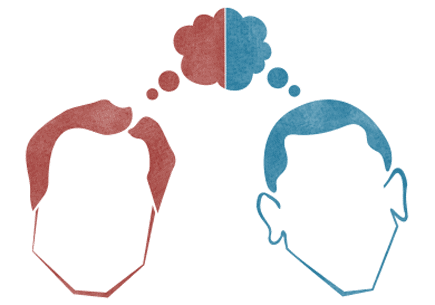Obama, Romney supporters: More in common than you might think?

(Phys.org)—It's a common refrain during the political season—Republicans and Democrats talk past one another. They claim they live in different universes or come from different species, with little hope for extending empathy across the political aisle.
But University of Michigan researcher Yesim Orhun and her colleague Oleg Urminsky of the University of Chicago say that there exists a greater respect for one another's views than is generally assumed.
"Psychologists have claimed that people stop thinking about how they feel when trying to make sense of others' feelings when others are seen as very different," said Orhun, assistant professor of marketing at the U-M Ross School of Business. "Therefore, we would not expect people to rely on what they know about themselves to make sense of voters for the opposing candidate. But they do."
In a new study forthcoming in the Journal of Marketing Research, Orhun and Urminsky explore how one's own evaluations might affect inferences about others' evaluations of choice options—conditional on knowing others' choices.
The researchers, who say their findings are applicable to the current presidential campaign between President Barack Obama and challenger Mitt Romney, conducted surveys during the last presidential election between Obama and John McCain in 2008.
They asked people to rate how much they liked each candidate and then to estimate the same ratings among other survey-takers who were backing either Obama or McCain. They found a surprising pattern when they looked at people's estimates for how they thought voters in the opposing camp rated the candidates.
"We found a strong link between people's views and assumptions about supporters of the opposing party," said Urminsky, associate professor of marketing at Chicago's Booth School of Business. "For example, the more strongly the Obama voter liked Obama, the more strongly she thought McCain voters liked McCain. And the more strongly the Obama voter disliked McCain, the more strongly she thought McCain voters disliked Obama."
Their results show that most voters do, in fact, use their own views as a template for estimating the corresponding views of voters on the other side.
"Most psychology research had suggested that the Obama voter would not rely on her own views to make sense of McCain voters, because she would see them as too different from herself. A few researchers suggested there might be a polarizing relationship," Urminsky said.
But Orhun's and Uminsky's results indicate a completely different pattern. In subsequent studies, they also extended these results to a wide range of other choices such as posters, digital cameras, art and video game consoles.
"Even if others' choices are different from ours, we continue to see others as broadly similar to ourselves," Orhun said. "We think to ourselves, 'How they reached their decision must be similar to how I reached mine.'
"So, if you find yourself using your own views to make sense of the opposing political views of a relative or neighbor, you are not alone—it's how we see across the divide."
More information: The paper, "Conditional Projection: How Own Evaluations Impact Beliefs about Others Whose Choices Are Known," can be found online at: www.journals.marketingpower.co … /10.1509/jmr.10.0052
Journal information: Journal of Marketing Research
Provided by University of Michigan















